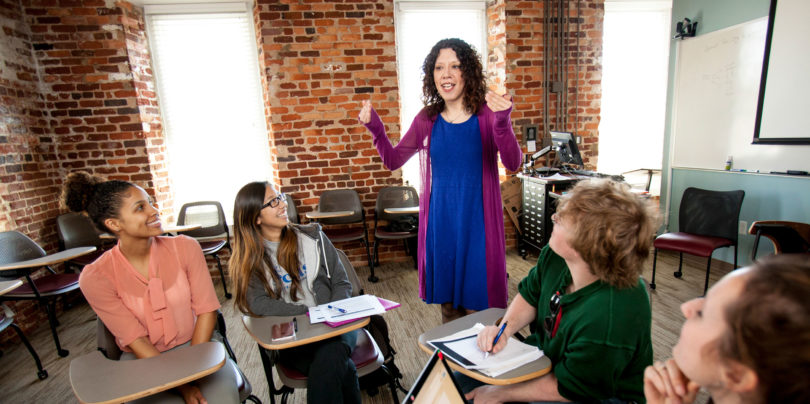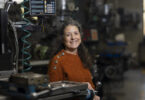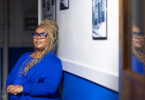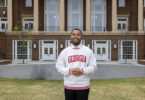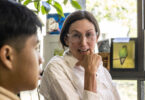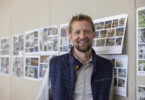Jennifer Elkins, an assistant professor in the School of Social Work, is part of a team of researchers who are leading a program that helps parents form and sustain healthy relationships while making progress toward lasting economic stability.
Where did you earn degrees and what are your current responsibilities at UGA?
I earned my bachelor’s degree in psychology and social work at the University of Wisconsin in Madison and went on to obtain my master’s degree in social work there as well. I worked nearly five years as a clinical social worker with children, adolescents and adults who experienced domestic violence, sexual violence and child maltreatment before I went back to school to earn my doctorate in social work at Columbia University. My research, teaching and service center on understanding the impact of chronic, cumulative and complex traumatic experiences in diverse populations over the life course, and working toward multi-systemic, culturally responsive, trauma-informed, “whole-person, whole-community” approaches to lower overall risk and strengthen protective mechanisms with individuals, families and communities. One of my lines of research centers around the historical and intergenerational transmission of trauma and resilience. I have found the historical trauma framework to be a unique, innovative and effective approach to begin the process of healing, reconciliation and restoration associated with the trauma of historical and ongoing systemic racism, oppression and social injustice experienced by indigenous peoples and other historically marginalized populations.
When did you come to UGA and what brought you here?
I came to UGA in 2011 immediately after graduating from Columbia University. When I was applying for faculty positions, a good fit was most important to me and I didn’t limit myself to any particular geographic area. Everything clicked when I came here for my campus interview-I remember feeling very excited after I left. I was impressed with the faculty and students; the school’s explicit commitment to human rights, civil rights and social justice; and the opportunity to be at a flagship university where I could jump in and take a leadership role in the area of trauma, violence and abuse on campus and in the community.
What are your favorite courses and why?
Our graduate students are passionate, engaged and pretty amazing overall-which makes it easy to enjoy teaching all my classes. However, I do have a few favorites. The first is my dream course to teach-a class I developed focusing on assessment and treatment of childhood trauma. This class is designed to help integrate, deepen and broaden students’ knowledge and skills for practice with traumatized populations. A central component of this class is the use of a capstone case assignment that culminates in an interactive panel discussion with experienced child trauma experts. The second is a required course called “Human Behavior in the Social Environment.” This course integrates knowledge and theories about the development of individuals over the life course. There’s also a significant emphasis on understanding the interplay with the environment and the impact of social stratification, marginalization, discrimination, oppression, racism and privilege and the ways that historical, social, political, cultural, spiritual, biological and economic factors shape and influence individuals. It can be a challenging course to teach because it covers a large amount of content, however I love teaching it because it’s one of the few classes that bridge the micro-macro divide.
What interests you about your field?
What I love most about social work is its messiness, complexity and multi-systemic focus. I’ve always been drawn to social work because of the way it balances a commitment to clinical practice with an equal commitment to social justice, social change and advocacy with marginalized, oppressed and disadvantaged individuals, families and communities.
What are some highlights of your career at UGA?
I have several big and small moments that stand out. One highlight was helping secure a five-year $8.2 million grant with colleagues in the College of Family and Consumer Sciences and the College of Education. Project FREE (Fostering Relationship and Economic Enrichment) is a campus-community partnership promoting the safety and well-being of families involved in the child welfare system. It will reach nearly 1,500 families across 12 counties in Northeast Georgia. I also find it especially rewarding to have the opportunity to guide, mentor and fuel passion in emerging social work scholars and professionals. This is why the smaller moments-the thank you emails, discussions outside of class, the moments when I see things click and the light bulb go off in students’ heads-mean as much to me as the bigger moments.
What do you hope students gain from their classroom experience with you?
My teaching style emphasizes real-world application and clinical case examples, the use of creative techniques to encourage practical application and integration of both theory and research, and evidence-informed skill acquisition that honors social work as both an art and a science. My goal is to create a safe, trusting, authentic classroom environment that nurtures students’ curiosity and passion, increases critical thinking and reflection-in-action, and better prepares students to tolerate ambiguity and be lifelong learners.
Describe your ideal student.
I appreciate students who are prepared, passionate, curious, engaged, honest, critical, self-reflective and energized. A student who is-or is working to be- comfortable being uncomfortable. Students who are ready to be pushed and challenged. Students who push, challenge and teach me.
Community/civic involvement includes…
I currently serve as a board member at The Cottage Child Advocacy and Sexual Assault Center. My social work career began in organizations exactly like this one. It’s such a privilege to now be on the other side, supporting the wonderful and important work being done to raise awareness and facilitate the healing of individuals, families and communities affected by sexual violence. I’m also very involved in other community based efforts and organizations at UGA and in Athens focused on positive youth development; trauma, grief and loss; and trauma-informed care. For example, I am currently partnering with campus and community stakeholders that represent crucial entry points for trauma-informed support, prevention and intervention here in Athens. Together, we are planning a summit in May to continue the momentum toward moving Athens closer to being a “trauma informed community.”
Favorite book/movie (and why)?
The first book that jumps out in my mind as having the most impact and influence on me is David Halberstam’s “The Children”- a chronicle of the civil rights movement told through the eyes of several young student leaders. It’s absolutely riveting, inspiring and motivating. When I first read it, I was about the same age as the foot soldiers featured in this book. This realization had a big impact in shaping the kind of person, social worker and leader I wanted to be. It’s nearly 800 pages, but I’ve read it several times and swear it’s a page turner!


